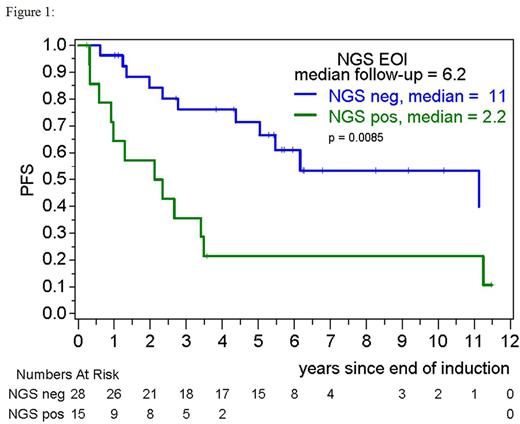Abstract
Introduction: MRD monitoring is of great value to determine the risk of relapse in patients with follicular lymphoma (FL).However, MRD assessment is mainly restricted to those 50-65% of patients harbouring a PCR-detectable t(14;18) rearrangement as clonal marker for RQ-PCR. Next generation sequencing (NGS) of immunoglobulin (IG) gene rearrangements might overcome limitations of current PCR-based approaches. Our aim was to test the stability and reproducibility of a standardized amplicon-based NGS approach developed by the EuroClonality-NGS Consortium to a): detect clonally rearranged IG clonotypes and b) to use IG-NGS for MRD quantitation in FL.
Methods: Peripheral blood (PB) and bone marrow (BM) samples were collected within randomized trials of the German Low-Grade Lymphoma Study Group (GLSG) and Fondazione Italiana Linfomi treating first-line stage III/IV FL with combined immunotherapy regimen. At first we tested the applicability of NGS for MRD marker screening in randomly selected diagnostic samples from 100 patients (50 PB, 50 BM). Next, NGS-MRD was assessed by sequencing IGH clonotypes in 113 FL patients selected according to the presence of a clonal IGH rearrangement by consensus PCR at diagnosis and the availability of post induction follow-up samples for MRD. Paired-end libraries were prepared and sequenced on Illumina MiSeq (2 x 250bp). FU samples were spiked with predefined copy numbers of internal reference DNA to enable assessment of MRD by normalisation of NGS reads after sequencing. Identification of IGH clonotypes and quantitation of MRD was done with the bioinformatic analysis pipeline ARResT/Interrogate (Bystry, Bioinformatics, 2016). For clonotype identification we used a 5% threshold. For validation NGS results were compared to classical RQ-PCR with either t(14;18) RQ-PCR (n=38 pats.) or IGH ASO RQ-PCR (n= 32 pats.).
Results: Marker screening by NGS detected clonal IGH-FR2 sequences with comparable frequency of 26/50 in PB and 24/50 BM samples. Additionally, IGK light chain clonotypes were detected with similar frequencies, thus leading to an IG clonotype being detected in 64% of samples.
In the patient cohort analysed for MRD NGS identified an IGH clonotype in 105/113 diagnostic samples. MRD results by RQ-PCR were available in parallel from 70 patients. In 5/8 NGS-neg. diagnostic samples RQ-PCR demonstrated circulating FL cells above the quantitative range underlining the role of somatic hypermutation potentially resulting in false-negativity. At follow-up, 43/123 samples were MRD+ and 42 were MRD- by both methods. 32 were MRD+ by RQ-PCR only, 6 by NGS only. 16/32 NGS-/RQ-PCR+ samples showed low-level MRD below <1E-04 by RQ-PCR. MRD results determined by NGS were well correlated to RQ-PCR values (r2=0.599, p<0.00001).
Correlation of NGS-MRD response with outcome in 43 patients from the GLSG cohort demonstrated that achievement of MRD response in PB and/or BM at end of induction is associated with a significantly longer median progression free survival of 11 years compared to 2.2 years for MRD+ patients (median follow-up 6.2 years, Figure 1).
Conclusions: The standardized EuroClonality NGS approach shows robust identification of IGH clonotypes in FL patients allowing reliable MRD monitoring. Lymphoma infiltration of diagnostic samples and somatic mutation of IGH are critical points for clonotype identification by NGS. IG-NGS can complement current MRD methods allowing MRD assessment in the majority of FL patients.
Pott: Roche: Honoraria, Membership on an entity's Board of Directors or advisory committees, Research Funding; Janssen: Membership on an entity's Board of Directors or advisory committees. Boccadoro: Novartis: Honoraria, Research Funding; Amgen: Honoraria, Research Funding; AbbVie: Honoraria; Mundipharma: Research Funding; Sanofi: Honoraria, Research Funding; Bristol-Myers Squibb: Honoraria, Research Funding; Janssen: Honoraria, Research Funding; Celgene: Honoraria, Research Funding. Kneba: AbbVie: Consultancy, Honoraria, Other: travel support, Research Funding; F. Hoffmann-LaRoche: Consultancy, Honoraria, Other: travel support, Research Funding; Gilead: Consultancy, Honoraria, Other: travel support, Research Funding; Janssen-Cilag: Consultancy, Honoraria, Other: travel support, Research Funding; Mundipharma: Consultancy, Honoraria, Other: travel support, Research Funding. Hoster: Roche: Other: Travel support, Research Funding.
Author notes
Asterisk with author names denotes non-ASH members.


This feature is available to Subscribers Only
Sign In or Create an Account Close Modal